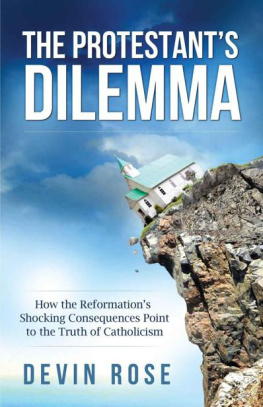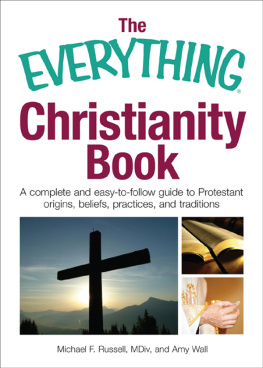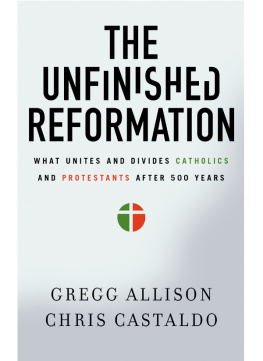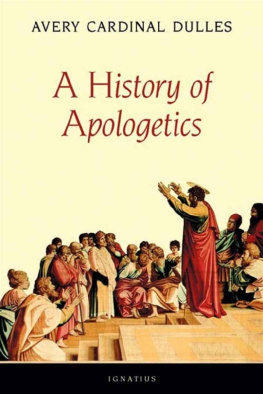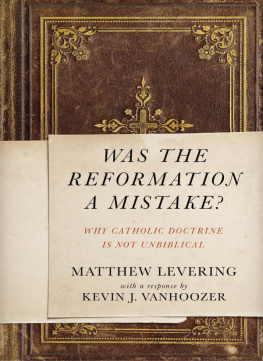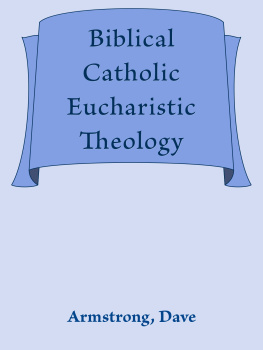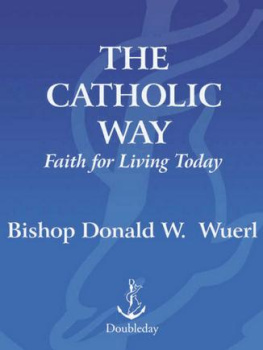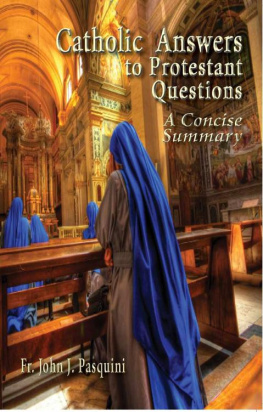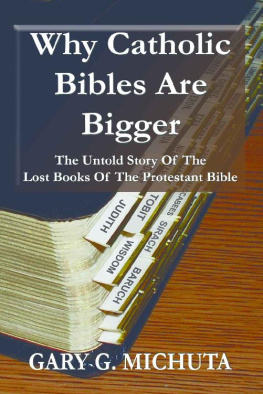If Protestantism is True
Devin Rose
If Protestantism is True
The Reformation Meets Rome
Unitatis Books
Unless otherwise indicated, Scripture selections are taken from the New American Bible (NAB), Copyright 1991, 1986, 1970 by the Confraternity of Christian Doctrine, Washington, D.C., 20017. All rights reserved. Selections marked NIV are from THE HOLY BIBLE, NEW INTERNATIONAL VERSION, NIV Copyright 1973, 1978, 1984, 2010 by Biblica, Inc. Used by permission. All rights reserved worldwide. Selections marked RSV are from the Revised Standard Version Bible, Catholic Edition, Copyright 1965 and 1966 by Divisions of Christian Education of the National Council of the Churches of Christ in the U.S.A. If any copyrighted materials have been inadvertently used in this work without proper credit being given in one manner or another, please notify Devin Rose at Unitatis Books so that future printings of this work may be corrected accordingly.
2011, Devin Rose
Published by Unitatis Books
All Rights Reserved
ISBN-13: 978-0615445304
ISBN-10: 0615445306
Printed in the United States of America
Dedication
To my wife, Catherine, for her tireless support and encouragement with this book and with all my projects.
Contents
Conclusion: To Find the Truth,
Follow the Trail of Authority
Acknowledgments
To Catherine, my loving wife, who juggled our four young children for hours on end while I worked on the manuscript. To Betsy Stokes, for her thoughtful editing. To Tekeme Studios, for designing the books cover and website. To all my Protestant brothers and sisters in Christ, through whom I came to know Jesus and who have patiently engaged with me in dialogue about these important issues. To all my Catholic friends and family, for encouraging me in my faith. To blog readers, facebook friends, podcast subscribers, for your years of faithful reading, listening, and support. For their wit and wisdom, as well as the inspiration for the books subtitle, I want to thank the contributors of Called to Communion. Finally, none of this would matter were it not for Jesus Christ, our Lord and King.
Chapter One
A Search for Truth
I believe and profess all that the Holy Catholic Church teaches and proclaims to be revealed by God.
But it was not always so. I grew up secularly. My mother was brought up in a particularly legalistic branch of the churches of Christ denomination, and my father, in the Episcopal Church . But the only church I remember going to as a child was a Unitarian Universalist one, and we went there for just a short time. The sole Unitarian sermon I recall having to sit through included a joke about (then Vice President) Dan Quayle that got big laughs from the congregation. I was taught at home and at school that humans evolved without purpose from primordial ooze, so unsurprisingly, when I became old enough to reason about such things, I proudly declared that I did not believe in God.
In high school, I came to base the perception of my own worth as a person on what others thought of me. It was an unstable foundation to be sure, but so long as everyone thought well of me and I had nothing to be humiliated about, all was well. Eventually however, this way of thinking caught up with me, and I reached a point where I could not hide any longer from it. That point came during my sophomore year in college. On the outside, my life was really great: I made good grades in school and had a nice girlfriend, a family who loved me, and lots of friends. But on the inside, I was beginning to be eaten alive by anxiety. It started out small and slowly got worse. I began getting nervous in social situations like going to restaurants, to the movies, and eventually, just being in class for school. My stomach would churn, and I would fear having to run out of the classroom, embarrassing myself in front of everyone.
Other humiliating aspects from these disordered anxieties began to surface: when I felt really anxious, I would begin noticeably sweating, for no apparent reason. And when the anxieties became really bad, I would have panic attacks, where my heart would start beating frantically, and my fears would feed into one another in a spiraling cycle that I could not control. I did a good job of hiding my anxieties from others, bottling all of it inside and trying to think my way out of the fears.
During my junior year, I was interning for a semester and living with my mother, and I began having headaches every day. This persisted for five months solid. They wore down what little physical and emotional strength I had left within me, and near the end of my internship, I was driving home each day hoping that a car would swerve into my lane and kill me. Here I was, an honor student, full-scholarship holder, and a talented athlete surrounded by good friends and family, and I had reached a point where I wanted to die rather than suffer through another day of hiding my problems. It was at that point that I faced for the first time what my atheistic beliefs really meant: despair. Always before in my life, the thin veneer of comfort, prosperity, and general well-being had protected me from facing the terrifying existential conclusions of my worldview. One day, in a disturbing waking dream, I saw before me total, empty blacknessa vivid manifestation of my utter hopelessness.
Finally I told my mother about my anxieties. (I thank God now that even in despair, He gave me a loving mother to whom I could turn when I thought that I had nowhere else to go.) She suggested that I see a psychologist, which humiliated me further, because I had always looked with disdain upon people who went to psychologists. To my great relief, however, the psychologist helped me realize that my condition was not unique. She taught me some cognitive behavioral therapy techniques, including breathing exercises and positive thinking. These helped, but only in a limited way. My anxieties persisted almost as strongly as ever, and I realized then that I was in trouble: I was clinically depressed, suffering from frequent panic attacks, and fighting a titanic struggle with never-ending anxieties. I believed that my problems were just chemicals in my brain, but I had tried every tactic that I could think of to beat the anxiety, and none had worked. My once-reliable intelligence now failed me utterly, so I faced a choice: either commit suicide or try to believe in God. For some reason, that was the dichotomy in my heart, even after years as an ardent atheist.
I decided to try belief first, with suicide as the backup plan. I knew that if God did not exist, then trying to believe in him would not work, because it would just be me trying one more mental tactic among the multitude that I had already tried without any success. But if God did exist, then I shouldnt kill myself without giving Him a fair shake. Still, the stupidity of asking God for help revolted me. But with nothing to lose, I gave it a try. I began praying for the first time ever by saying, God, you know I do not believe in you, but I am in trouble and need help. If you are real, help me. I also started reading the Bible to learn about Christianity, starting with Genesis, for I was determined to begin at the beginning.
The initial result of my prayers was, well, nothing . I didnt see God or Jesus or anything supernatural. No one whispered anything in my ear. If I had an angel, he didnt come to visibly embrace me and kick my demons out. My problems didnt go away, nor did they seem to lessen noticeably. This disappointing result did not surprise me but instead wryly confirmed what I had always believed: God doesnt exist, so thinking Hell help you is foolish. But when you are in the ocean and all you have is a life preserver, however small it may be, its the only hope that youve got. So I kept asking God for help every day and kept reading the Bible, though the King James Version with its thees and thous and begats made for near-inscrutable study. Slowly, however, under this simple regimen of prayer and reading, things began improving slightly, enough for me to notice a difference. Once, a picture formed in my mind of a little sapling in the woods, overshadowed by huge trees. I knew that this sapling represented my faith in God: tiny, vulnerable, frail. All my beliefs sought to destroy the sapling: atheism, atheistic evolution, the absurdity of believing in God, and the doubts that some invisible being could help me. So I protected the sapling in my mind, knowing that I had to give it a chance to grow, that it was the only possible lifeline I had. When my thoughts rebelled against belief in God or assaulted me with a myriad of doubts while reading the Bible, I pushed those thoughts aside, suspending the disbelief and exerting myself to believe, all the while telling God that He had better help me if He valued my life at all.
Next page

